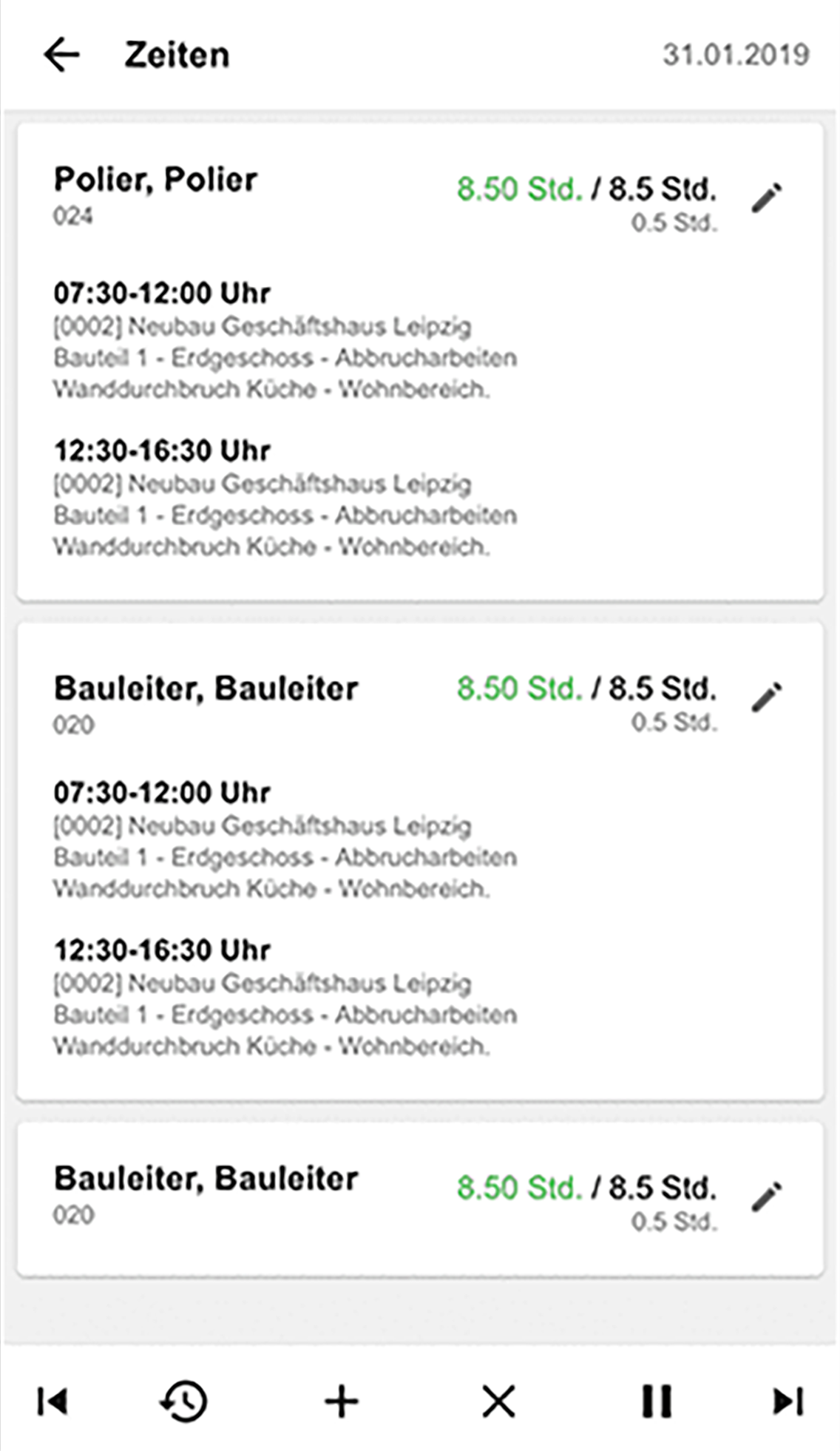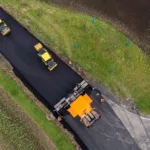
In 2022, the German Federal Labor Court (Bundesarbeitsgericht, BAG) ruled that companies in Germany are obliged to record the working hours of all employees in full. But how exactly is this time tracking obligation to be implemented in the construction industry? A draft law from the German government is to clarify this as soon as possible. Find out here what the current status is and what challenges need to be solved in this regard.
Recording of working hours in the construction industry already mandatory today
In a decision in mid-September 2022, the German Federal Labor Court (Bundesarbeitsgericht, BAG) ruled that companies in Germany are obliged to systematically record the working hours of their employees. According to the court, this obligation to document the general working time results from paragraph 3 of the German Occupational Health and Safety Act (ArbSchG).
Time tracking required by EU law for some time now
The Federal Labor Court’s decision is based on a 2019 ruling by the European Court of Justice (ECJ), which called on member states to introduce an objective, reliable and accessible system to measure the daily hours worked by each employee. The basis is the Charter of Fundamental Rights of the European Union. There, Article 31 states that the limitation of working time, as well as the observance of rest periods, is a fundamental right of every employee. A documentation obligation is also laid down there – but how this is implemented is up to each member country.
Proposed German legislation on working time recording planned for 2023
The decision by Germany’s highest labor court judges that employers already have an obligation to record their employees’ working hours has put legislators in a bind. The German Federal Ministry of Labor has announced a draft law on the recording of working hours for the first quarter of 2023 in order to transpose the European requirements into national law. The framework for implementation, affected industries and possible exceptions have yet to be determined by the legislature.
What businesses in the construction industry need to know about the time recording obligation
The ruling of the BAG and its justification result in a number of points that you should know about the obligation to time tracking in the construction industry (as of 01/2023):
- Working hours must be fully documented: According to the ruling issued at the beginning of December 2022, there is a general obligation to record working hours: this includes the start of work, breaks, end of working hours and overtime. It is not enough to simply provide a time tracking system. The employer must actually document the working time. Important: A blanket statement that your employee worked eight hours, for example, is not sufficient.
- Trusted working time still possible: The new regulations do not alter the tried-and-tested rules on trusted working time. Employees may continue to arrange their contractually agreed working hours to suit their individual needs. Flexible working time models are therefore still possible. The main thing is that the working hours are documented and, most importantly, that they do not violate the Working Hours Act.
- Different types of time tracking are permitted: You can record working time in your company manually, electronically or digitally – digital time tracking is not (yet) mandatory in the skilled trades sector or in the entire construction industry. However, the time recording system must be audit-proof and practical for you and your team to ensure that working hours are actually recorded. In addition, the works council can co-determine the form in which working hours are recorded.
- Not everyone affected by compulsory time tracking: Senior executives who, for example, decide on the hiring and firing of employees, will probably continue to be exempt from the obligation to record working time in the skilled trades sector (source: Personalwirtschaft).
- Currently no penalties to be expected: Currently there are no consequences for companies for missing or incorrect time tracking. A penalty can only be imposed if the responsible authority has ordered the introduction of a time recording system and it is not implemented. However, it can be assumed that violations will be sanctioned at the latest with the upcoming revision of the Working Hours Act.
Obligation to record working time in the construction industry is not new
Even if there is not yet a general obligation to (digitally) record working time, laws already prescribe comprehensive obligations to record working time, for example the Minimum Wage Act, the Employee Posting Act or the Act to Combat Clandestine Employment, which also affects the construction industry.
Recording obligation already exists in part now
In addition, you must observe the requirements of the Working Hours Act. For example, work on Sundays and public holidays, as well as overtime after § 16 par. 2 Working Hours Act (ArbZG) subject to record-keeping requirements. The obligation to record overtime, however, only begins when the eight or ten hours of work per working day are exceeded.
Breaks must already be observed
Also, keep in mind that your employees are taking their rest breaks:
- After 6 hours of work: 30 minutes break
- After 9 hours of work: 45 minutes break
- Between two working days: 11 consecutive hours break
- In a 7-day period, a break of at least 24 consecutive hours
In Austria and Switzerland, there is already an obligation to record working time
In Austria, recording of working hours is required by law for all employees. You must document in writing the beginning and end of the workday, the daily working hours, and all breaks. In Switzerland, too, employers are obliged to record the working hours of their employees. They must be able to provide detailed information to authorities upon request. The recording includes the daily and weekly working time, including all compensatory time, overtime as well as breaks of more than 30 minutes. Employers may delegate recordkeeping to their employees.
Not (yet) mandatory: Why does digital time tracking make sense in the skilled trades?
The jurisdiction makes no distinction between employees who work at a fixed location and those who work in the field or are mobile. Craftsmen are often mobile and go directly home from their place of work. Requiring them to record their work hours on a piece of paper can also lead to unrecorded overtime or time theft. If a dispute then arises between the employee and the employer about the working hours, it is difficult for both sides to provide court-proof evidence in the case of handwritten hour records.

Mit einer digitalen Zeiterfassung dokumentierst du alles korrekt.
A digital time tracking tool can help document these times correctly and prevent disputes from arising. By the way: Travel time from home to the first customer of the day and from the last customer of the day back home is considered working time and must be compensated. On the other hand, craftsmen must also record all travel time they have as working time.
Advantages of digital time tracking in the construction industry
When does the workday begin, when does it end, what breaks were taken by the employee? Today, this information is already recorded by many employers on a day-to-day basis for each individual employee. Although there is currently no law and therefore no obligation for digital time tracking in the construction industry, such digital systems are worthwhile for you as an employer and for your employees.
The legal obligation to track time is a fitting occasion to finally switch to digital time tracking!
These are the advantages of using digital time tracking in the construction industry:
- Digital time tracking has established itself as the standard and offers numerous advantages over traditional paper-based time tracking in the skilled trades and construction industry. It reduces errors, time and costs in daily operations, for example through manual rework or calculation of working time. Digitally recorded working time ends up directly in payroll accounting, making payroll possible at the push of a button.
- Time tracking software gives you real-time visibility into your team’s work hours and tasks. This gives you a better overview and allows you to plan and schedule more accurately. Even in the event of company audits, all data is accessible with a simple click.
- The team will love the app as they can easily record the start and end of the working day, view their working time account from anywhere and thus cross-check their weekly working hours. Timesheets and the associated problem of always having some missing at the end of the week are a thing of the past for you as an employer. In addition, accurate time tracking helps employees prove their overtime. Any overtime worked can be easily tracked and compensated.
Not yet fully convinced? Then learn about the success story of Prange GmbH, which introduced 123onsite’s mobile time tracking in its roofing business after just two months of trial operation instead of the planned six.
You are currently viewing a placeholder content from Youtube. To access the actual content, click the button below. Please note that doing so will share data with third-party providers.
More InformationThe solution: With time tracking from 123onsite you gain efficiency
The general obligation for time tracking represents a good opportunity to switch to a digital solution. With the 123onsites app, you benefit from the advantages of mobile time tracking on the construction site and also fully comply with legal requirements.
123onsite simplifies working time recording for everyone
The good news is that you don’t need expensive terminals or other complex hardware for modern digital time tracking. The mobile time tracking software runs on your own computers. Your team can easily check in, take a break or check out at any time via a free app. Employees are immediately assigned to the corresponding construction sites. So you have an overview of all your construction sites in real time.
All entries are available in real time for mobile employees and the office for billing and can be edited by your employees at any time in a DSGVO-compliant and legally secure manner. The app also documents changes, which makes errors or manipulations almost impossible.

THIS IS WHY 123ONSITE IS BENEFICIAL FOR COMPANIES IN THE CONSTRUCTION INDUSTRY
In a comparison of time recording systems conducted by the Chamber of Skilled Crafts Frankfurt-Rhein-Main, 123onsites left the competition behind.
You’ll believe that when you see it? Understandable – so just try it out for free.
Advantages of the software for your company in the construction industry
- Fair price scaling according to the number of employees – so the software is also worthwhile for small construction companies and craft businesses
- With the app, employees can check in quickly, but also view their time account, submit a vacation request or call in sick
- Users can also capture data offline when there is a dead spot on the construction site
- Software-as-a-Service (SaaS): use a low-cost cloud solution instead of buying expensive software
- always up-to-date
- no maintenance
- no lengthy updates
- no server farm required
- quick implementation
- Part of a large group of companies: 123onsite is a company of NEVARIS Bausoftware GmbH and thus part of the Nemetschek Group.
By the way: The 123onsite time tracking app is also available in seven Eastern European languages: Bulgarian, Croatian, Polish, Romanian, Russian, Czech and Ukrainian.
Learn more about the features of 123onsite
In our webinars, you will gain insight into the comprehensive features of 123onsite – from time tracking on the construction site to construction wages and practical forms.
How to master the duty of time tracking in the construction industry
If you already document the working hours of your colleagues in any form, nothing will change for you for the time being as a result of the BAG’s case law. Even if digital time tracking will not become mandatory in the construction industry in 2023, as corresponding laws with framework conditions for recording working time are still missing, you should still become active voluntarily with regard to possible future requirements and drive forward digitization in the skilled trades in your company now. By acting quickly and implementing a mobile time tracking system, you can secure an advantage over competitors who are not yet practicing Construction 4.0.
We would be happy to advise you on the introduction of digital time tracking for your business in the construction industry, so that you are one step ahead of the coming obligation.








